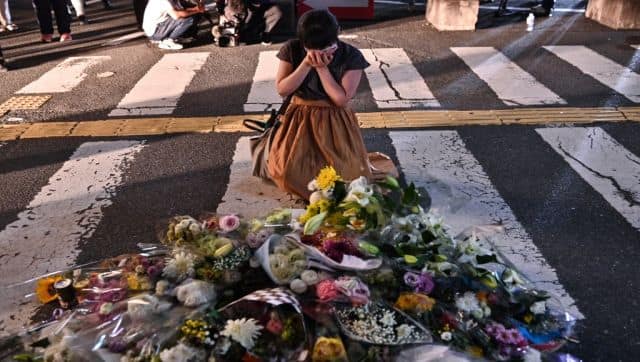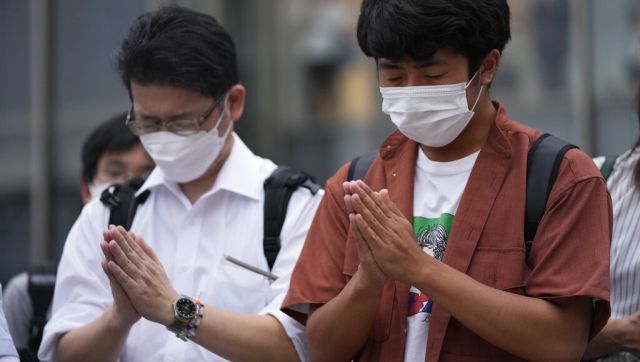Japan’s longest-serving prime minister Shinzo Abe was assassinated while giving a speech during an election campaign in the city of Nara, in the country’s west on Friday. A 41-year-old suspected of carrying out the shooting has been arrested. The killing of Abe has sent shockwaves across the world, especially in Japan, where there is zero-tolerance for the ownership of guns. Even rarer is political violence in the country – the last time a former or sitting prime minister was killed was nearly 90 years ago . Also read: Shinzo Abe assassinated: A look back at the Abe-Modi bromance We take a look at why gun violence is so rare in Japan. A centuries-old policy The zero-gun tolerance policy in Japan dates back centuries. The Japanese were awarded to give up firearms as early as 1685. Iain Overton, executive director of Action on Armed Violence and the author of Gun Baby Gun, describes it as “perhaps the first-ever gun buyback initiative”. “They are the first nation to impose gun laws in the whole world and I think it laid down a bedrock saying that guns really don’t play a part in civilian society,” Overton told BBC. The stringent laws A law on the possession of swords and firearms was introduced in 1958 after World War II. “No one shall possess a firearm or firearms or a sword or swords,” it said, according to a report in The Guardian. In Japan, civilian ownership of handguns is banned. Only the sales of shotguns for hunting and sport and air rifles are permitted. However, owning a gun is cumbersome and involves a long process. [caption id=“attachment_10887421” align=“alignnone” width=“640”]  A woman breaks down outside Yamato-Saidaiji Station in Nara where former Japanese prime minister Shinzo Abe was assassinated. AP[/caption] Getting a gun A potential buyer needs to join a shooting or a hunting club. They have to attend an all-day class which teaches them how to shoot and how to store the weapon safely. They also have to take a written examination and clear a shooting-range test with an accuracy of 95 per cent, reports CNN. That’s not all. A buyer has to undergo an evaluation where their mental health is monitored. A thorough background check is conducted to find out if there is any history of drug abuse. From criminal records to personal debts and relationships with friends and family, everything is scrutinised. Only if they clear these checks, can they apply for a permit. After purchasing a gun, it needs to be registered with the police. They need to buy a locker to store the weapon, which again is inspected. Fresh cartridges can be purchased only if the spent cartridges bought earlier are replaced. The police examine the gun once every year and owners are expected to sit for a retest every three years after taking a refresher course. This is needed to renew the gun licence. The laws in Japan also restrict the number of gun shops in the country. Japan has around 40 prefectures and there cannot be more than three in each one of them, BBC reports. [caption id=“attachment_10887431” align=“alignnone” width=“640”]  The assassination of Shinzo Abe has sent shockwaves across the country, where gun violence is almost unheard of. AP[/caption] Punishment for gun possession Before the assassination of Abe, the last public shooting of a politician was in 2007. Iccho Itoh, who was the mayor of Nagasaki, was shot at least twice at point-blank range by an alleged gangster. He died after suffering cardiac arrest, reports CNN. This pushed Japan to further tighten the laws and impose stricter punishment for gun violence. Possessing more than one gun is a crime, which carries a prison term of 15 years. Owning a gun as part of a crime syndicate also earns offenders a 15-year prison sentence. And firing a gun in a public space can lead to life imprisonment, according to the report. A handful of gun owners The stringent rules have kept gun ownership extremely low. According to GunPolicy.org, a firearm law and policy news website, the estimated total number of guns held by civilians in the country was 3,10,400 in 2019. This is the lowest level among G-7 nations, a group of the world’s wealthiest nations, according to a Bloomberg report. Compared to Japan, the United States had 393 million guns and the United Kingdom has 3.2 million, the report says. Where police avoid using guns In Japan, the police rarely use guns. Instead, they use martial arts to tackle offenders. Police officers do not carry weapons with them when not on duty; they are expected to leave them at the station. “The response to violence is never violence, it’s always to de-escalate it. Only six shots were fired by Japanese police nationwide [in 2015],” journalist Anthony Berteaux told the BBC in 2017. The rare cases of gun violence Incidents of gun violence are also extremely rare, which is why Abe’s death has left the nation even more shell-shocked. There were six reported gun deaths in Japan in 2014, according to the National Police Agency, and the number rarely exceeds 10, in a country of 126 million people. In 2006, just two people were killed in gun attacks, reports The Guardian. There were 10 incidents last year, which left one person dead and four wounded. With inputs from agencies Read all the Latest News , Trending News , Cricket News , Bollywood News , India News and Entertainment News here. Follow us on Facebook, Twitter and Instagram.
Japan is a largely arms-free nation with one of the world’s strictest gun control laws. The assassination of Shinzo Abe has stunned the country, which reported only 10 gun-related incidents last year
Advertisement
End of Article


)

)
)
)
)
)
)
)
)



